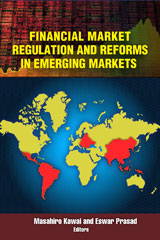Eswar S. Prasad
Nandlal P. Tolani Senior Professor of Trade Policy
 Financial Market Regulation and Reforms in Emerging Markets
Financial Market Regulation and Reforms in Emerging MarketsThe rapid spread and far-reaching impact of the global financial crisis have highlighted the need for strengthening financial systems in advanced economies and emerging markets. Emerging markets face particular challenges in developing their nascent financial systems and making them resilient to domestic and external shocks. Financial reforms are critical to these economies as they pursue programs of high and sustainable growth.
In this timely volume Masahiro Kawai, Eswar Prasad, and their contributors offer a systematic overview of recent developments in—and the latest thinking about—regulatory frameworks in both advanced countries and emerging markets. Their analyses and observations clearly point out the challenges to improving regulation, efficiency of markets, and access to the financial system. Policymakers and financial managers in emerging markets are struggling to learn from the crisis and will need to grapple with some key questions as they restructure and reform their financial markets:
What lessons does the global financial crisis of 2007–09 offer for the establishment of efficient and flexible regulatory structures?
• How can policymakers develop broader financial markets while managing the associated risks?
• How—or should—they make the formal financial system more accessible to more people?
• How might they best contend with multinational financial institutions?
This book is an important step in getting a better grasp of these issues and making progress toward solutions that strike a balance between promoting financial market development and efficiency on the one hand, and ensuring financial stability on the other.
Launch event: Brookings Institution, Washington, DC, June 6, 2011
Preview: Table of Contents, Overview
© 2020 Cornell University
Charles H. Dyson School of Applied Economics and Management